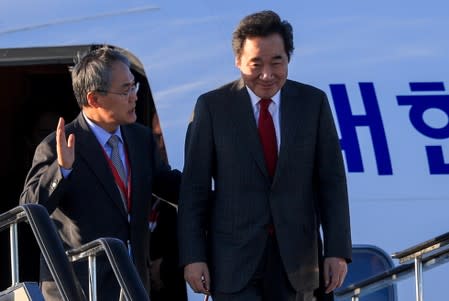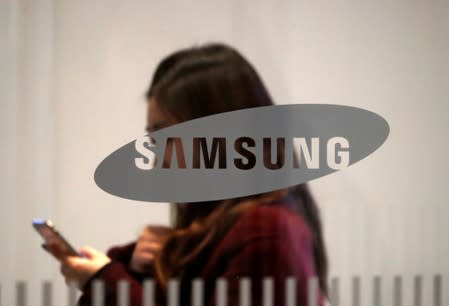Japan greenlights first South Korea export since July curbs, but with a warning
By Hyunjoo Jin and Tim Kelly
SEOUL/TOKYO (Reuters) - Japan has approved export of a high-tech material to South Korea for the first time since imposing tighter curbs last month, but doubled down on political pressure and warned it could broaden restrictions on shipments to its Asian neighbor.
The approval and subsequent warning illustrate how Tokyo is upping the ante in the diplomatic row while at the same time is unwilling to unilaterally stop exports to South Korea.
The dispute, rooted in their wartime past and exacerbated by the recent tightening of curbs on shipments of three high-tech components, has stoked nationalism and raised trade concerns.
Relations between the two U.S. allies worsened late in 2018 as part of a decades-old dispute over compensation for forced laborers during Japan's occupation. South Korea has invoked its difficult history with Japan, which colonized the Korean peninsula during World War Two.
South Korea's president, Moon Jae-in, said on Thursday that tighter curbs would undermine Japan's international credibility and accused Tokyo of using its industrial advantage as a weapon against another country.
"The measures so far undermine the trust of the free trade order and the international division of labor," Moon said.
"Even if there are any gains, it will be short-lived. In the end it is a game without winners, where everyone, including Japan itself, becomes a victim."
The latest export approval followed "strict examination", Japanese ministers said, cautioning that Tokyo could consider expanding its controls beyond the three high-tech materials.
"If improper use of exports are found beyond three high-tech materials, we will implement thorough steps to prevent recurrence including expanding application examination," Industry Minister Hiroshige Seko said.
Seko said Japan does not usually announce each export approval but did so this time after South Korea described Japan's recent curbs as an "embargo" on shipments.
South Korean Prime Minister Lee Nak-yon said Tokyo had allowed the export of EUV photoresists, a chemical crucial for Samsung's advanced contract chipmaking production.
Samsung declined to comment.
WHITE LIST
Japan has removed South Korea from the "white list" of countries with fast-track trade status, meaning some exporters may have to go through a lengthy permit application process to ship restricted items to South Korea.
That covers a broad range of items, including those applicable to weapons production and machine tools.
South Korea was scheduled to take a call on its plan to drop Japan from a similar "white list" of countries on Thursday, but trade ministry officials said the plan had been put off until further discussions.
Japanese officials have cited unspecified security reasons for their export curbs. But they have pointed to an erosion of trust after South Korean court rulings last year ordered Japanese firms to compensate wartime forced laborers.
Japan says the matter was settled by a 1965 treaty normalizing bilateral ties.
Given the curbs in place, Japan's approval to export the three materials could take up to 90 days, slowing shipments.
Shares of Tokyo Ohka Kogyo rose 3.9% and Stella Chemifa surged 10.1% after the latest approval. Tokyo Ohka Kogyo makes photoresists and Stella Chemifa produces hydrogen fluoride, both materials affected by the export curbs.
But it remains unclear if the initial approval from Tokyo signals a breakthrough in trade relations.
"They approved only one out of a number of items, and they said they would approve exports for pure civilian purposes," a South Korean senior trade ministry official told Reuters.
South Korean chipmakers are hitting a dead end in their quest to find alternatives for key Japanese materials that have been hit with export restrictions, raising the prospect of major disruption to their operations in coming months.
Of particular concern is sourcing of hydrogen fluouride, a key chipmaking material.
South Korean chipmakers have been desperate for Japan's high-purity hydrogen fluoride because it helps them get high "yield" rates, which is critical to making chips profitably.



